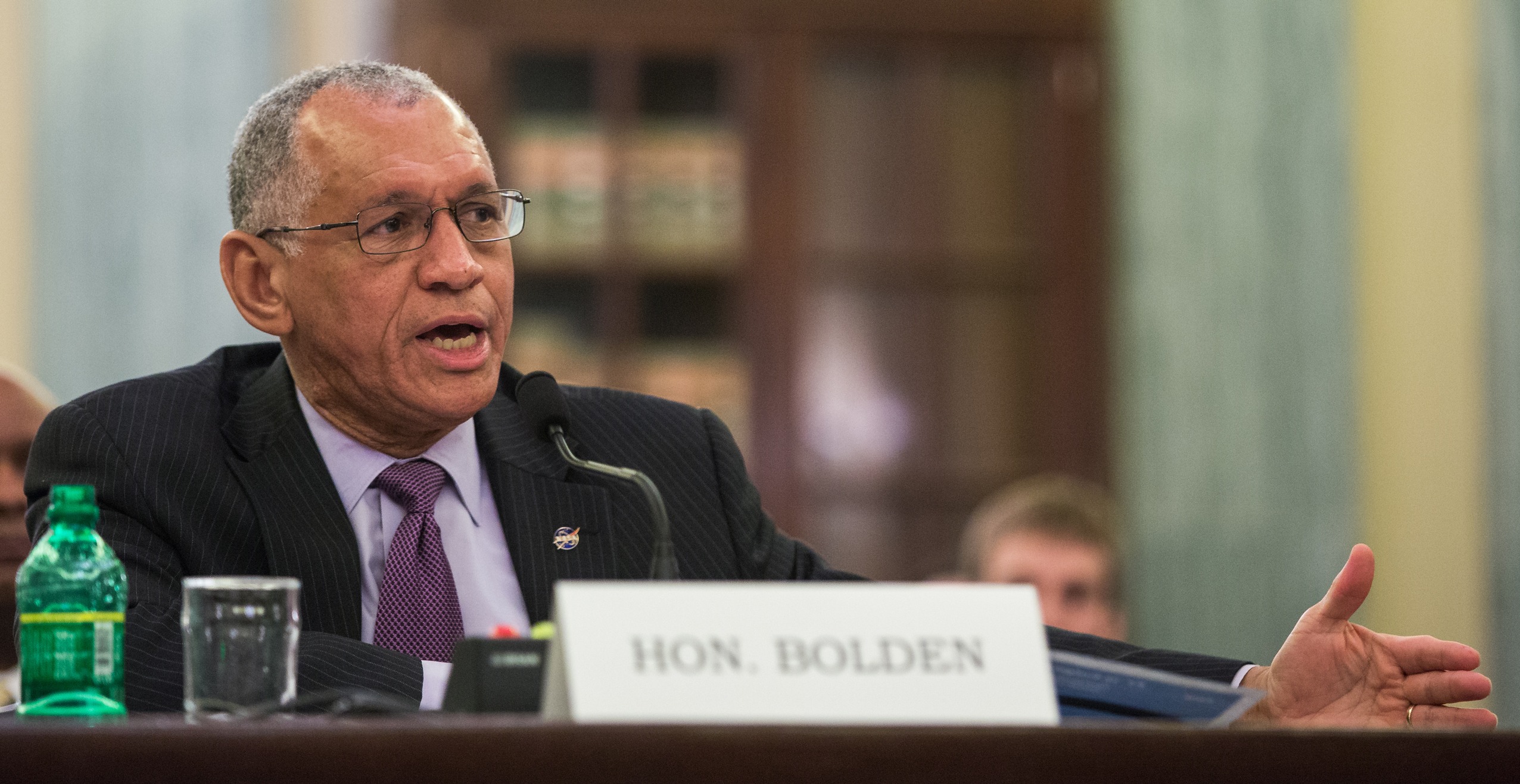During a mid-April meeting of the House Science, Space and Technology Subcommittee, Congressman Mo Brooks—an Alabama Republican best known for his nativist campaign against undocumented immigrants—was hectoring NASA Administrator Charles Bolden. One of seven climate-change deniers in the nine-member Republican majority on the subcommittee that authorizes NASA’s budget, Brooks was working a GOP meme that is part of a broad partisan attack on NASA’s Earth-science budget.
“‘National Aeronautics and Space Administration,’ end quote. I underscore the words ‘aeronautics’ and ‘space.’ Yet each year almost $2 billion of NASA funding is diverted from aeronautics and space to Earth sciences; i.e., global warming and climate change and similar initiatives.”
In 2006, when a 24-year-old journalism school dropout appointed by George W. Bush was limiting access to NASA’s climate scientist, Dr. James Hansen, the phrase “to understand and protect the home planet” was quietly removed from the space agency’s mission statement.
Bolden, a retired Marine Corps major general and former Space Shuttle commander, knew that his testimony was for the most part irrelevant. The Republican majority had already agreed to NASA’s total budget and line-item allocations. The committee hearing was political theater.
Funds are not “diverted.” Congress has appropriated funds for NASA’s Earth-science programs since 1986, when Ronald Reagan embraced the findings of 16 distinguished scientists who concluded that, “The people of the Earth … have become active participants on a worldwide scale, contributing to a process of global change that will significantly alter our habitat within a few generations.”
Bolden urged the committee to consider several programs covered by the Earth-science budget:
• Earth-observing satellites that many nations depend on to measure land cover/land-use change, the health of ecosystems, and water availability.
• Five Earth-science missions launched last year, which include a global precipitation measurement system and a system that monitors global soil moisture and snow melt, and predicts flooding.
• Collaboration with the Indian Space Research Organization in a project to measure processes, such as ecosystem disturbances and ice-sheet collapse.
But these programs, and hundreds more covered by the space agency’s Earth-science budget, are problematic for congressional Republicans, who deny the scientific consensus (97 percent of climate scientists) on anthropogenic climate change.
Americans identify with their space program. When NASA scientists report climate-change events—such as the May release of data on the accelerated collapse of Antarctic ice shelves—the American public pays attention. Cutting NASA’s Earth-science funding will slow the flow of information underscoring human activity on the planet.
The Obama administration has increased the agency’s Earth-science budget—from $1.4 billion in 2009 to $1.7 billion in 2015 to a proposed $1.9 billion in 2016, out of a total NASA budget of $18.5 billion. The subcommittee proposed reducing the Earth-science budget by 38 percent of the president’s budget request.
Texas Congressman Lamar Smith, who chairs the full Science, Space, and Technology Committee, and is a strident critic of the scientific consensus on climate change, confronted Bolden with a variation on Brooks’s trope: “One of the most glaring examples [of the Obama ignoring the space agency’s mandate] is the disproportionate increase in the Earth Science Division that it receives at the expense of other science divisions, and human and robotic space exploration. There are 13 other agencies involved in climate-change research, but only one that is responsible for space exploration.”
None of these 13 agencies has anything close to NASA’s capacity to launch satellites. And all of them depend on NASA data. Brooks and other Republicans on the subcommittee also argued that the Environmental Protection Agency should be doing the Earth-science research conducted by NASA.
During the subsequent markup of the authorization bill, amendments offered by Democrats to restore Earth-science funding failed.
In May, a House appropriations subcommittee approved Obama’s $18.5 billion request to fund NASA without specifying cuts to the Earth-science budget. But a statement accompanying the bill stipulated that planetary science will be funded above the administration’s $1.36 billion request; so funds will be shifted from Earth science to planetary science.
This aversion to climate science is part of the Republican Party’s DNA. In 2006, when a 24-year-old journalism school dropout appointed by George W. Bush was limiting access to NASA’s climate scientist, Dr. James Hansen, the phrase “to understand and protect the home planet” was quietly removed from the space agency’s mission statement.
Climate-change deniers will have another attempt to cut Earth-science funding when the Senate Subcommittee on Space, Science, and Competitiveness writes its NASA budget authorization. It is chaired by Texas Senator Ted Cruz, another climate-change extremist.
Lou Dubose is the editor of The Washington Spectator.
This article appears in the July 2015 issue of The Washington Spectator.






